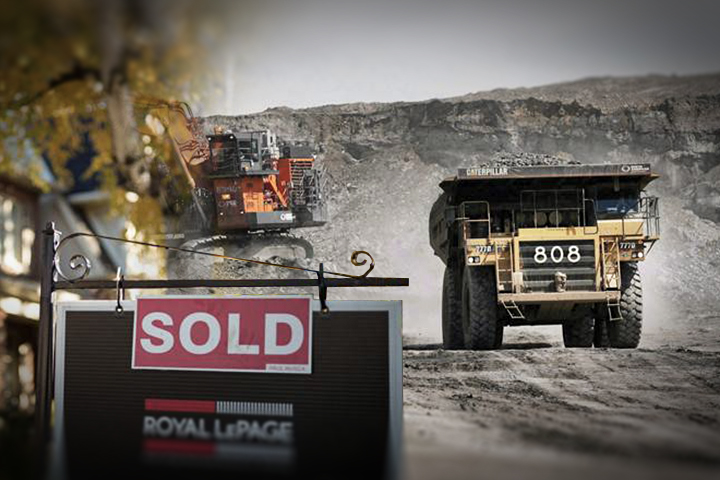Canada’s economy is steaming ahead, but will Ontario or Alberta take the lead?

Economists disagree on which province will post the fastest growth this year. According to the Conference Board of Canada, which published its spring economic forecast today, the crown belongs to Alberta. That province is projected to post a 3.3 per cent increase in real GDP.
READ MORE: Oil will help Alberta’s economy lead Canada in 2017. But that won’t translate into more jobs
On the other hand, RBC’s provincial outlook, released in March, has Ontario leading the pack with 2.5 per cent growth. The bank expects Alberta to expand 2.1 per cent this year — a solid performance but one substantially weaker than the gangbusters rate the Conference Board is predicting.
Meanwhile, TD, which also posted its latest numbers in March, has Ontario and Alberta tied at 2.6 per cent growth.
Who’s right?
Ontario
Economics isn’t an exact science and forecasts often differ. Still, both RBC’s and TD’s forecasts predate the Ontario government announcement in April of a slew of measures meant to cool down the province’s red hot housing market, including a Vancouver-style 15 per cent tax on foreign homebuyers.
READ MORE: Why Canada wins, but many Torontonians lose, from Ontario’s new housing measures
Home sales in the Greater Toronto Area fell by a whopping 26 per cent in the month following the introduction of the province’s plan, according to Toronto-based real estate brokerage Realosophy.
Indeed, a slowdown in southern Ontario’s housing market is part of the reason why the Conference Board expects the province’s economy to lose some momentum, coming in at 2.3 per cent of GDP.
The think tank is also skeptical about Ontario’s ability to keep up its above-average export growth, noting that “lack of business investment will limit growth prospects going forward.”
Alberta
If recent developments point to a possible slowdown in Ontario, some of the latest news headlines are fodder for optimism in Alberta.
Neither RBC nor TD’s forecasts capture the fact that the Organization of the Petroleum Exporting Countries (OPEC) decided last week to extend its oil production cuts.
The oil cartel’s cuts have propelled a rebound in oil prices toward $50 a barrel. And that bounce back was among the chief reasons for a pickup in economic activity in Alberta this year, RBC wrote before OPEC announced it would prolong the cuts even further.
READ MORE: Oil prices rise as OPEC production cut trims supply
“Non-conventional oil production in the province will see a big increase this year,” the Conference Board noted in today’s report, adding that the labour markets, consumer demand and the housing sector are also improving in the province.
At the end of March, RBC predicted the Calgary housing market would soon start to attract buyers, thanks to record affordability and an improving economic outlook.
READ MORE: Looking for an affordable home? You may want to buy in Calgary
Still, Alberta’s impressive growth rate this year largely reflects the fact that the province is regaining lost ground after two years of contraction.
Alberta is also struggling with ballooning debt and deficits, which led to another credit downgrade last week.
By contrast, Ontario comes off three years of solid growth and recently managed to squeeze out a balanced budget, even though the province’s stock of debt continues to grow.
WATCH: Ontario Progressive Conservative Leader Patrick Brown slams Ontario budget as a ‘sham’

The bottom line
Here are three things virtually every economist agrees on.
First, sadly, Newfoundland and Labrador will see a recession this year, despite growth everywhere else.
The Conference Board sees a contraction of three per cent of GDP this year, but predicts the economy will “bounce back strongly” in 2018, in large part thanks to the beginning of oil production at the Hebron project.
Second, overall, Canada will expand by a healthy rate of at least two per cent this year, a notable performance for an advanced economy.
Third, the bad news about Canada’s growth is that it continues to be attached to two rather unreliable economic engines: the housing market and the oil industry, both notoriously subject to boom and bust cycles.
READ MORE: Moody’s downgrades Canadian banks: Beginning of the end for the housing market?
Canadian businesses, on the other hand, continue to put off plans to invest and expand, even though borrowing is as cheap as ever.
In a cautionary note that stood out in an otherwise upbeat report, the Conference Board’s Marie-Christine Bernard warned that “weakness in business investment — both in and out of the resources sector — could hurt economic growth in all provinces down the road.”




Comments